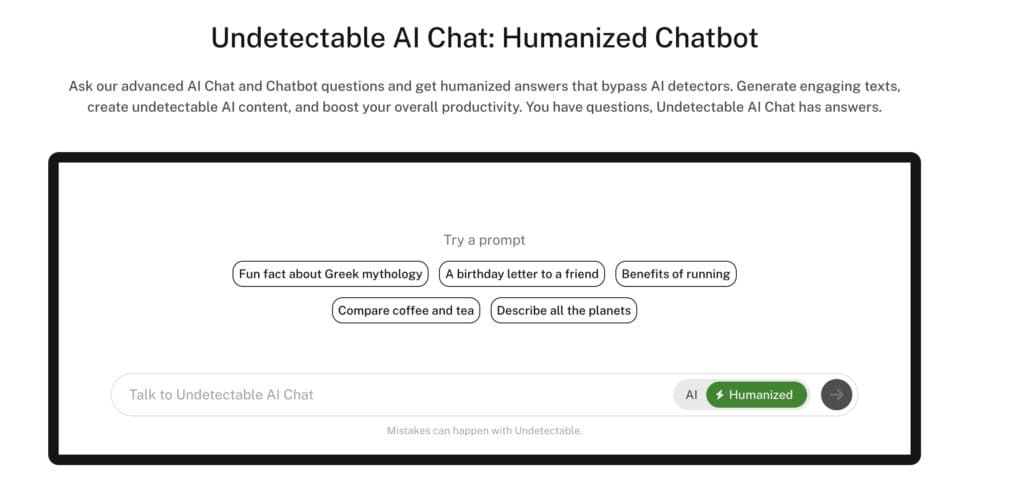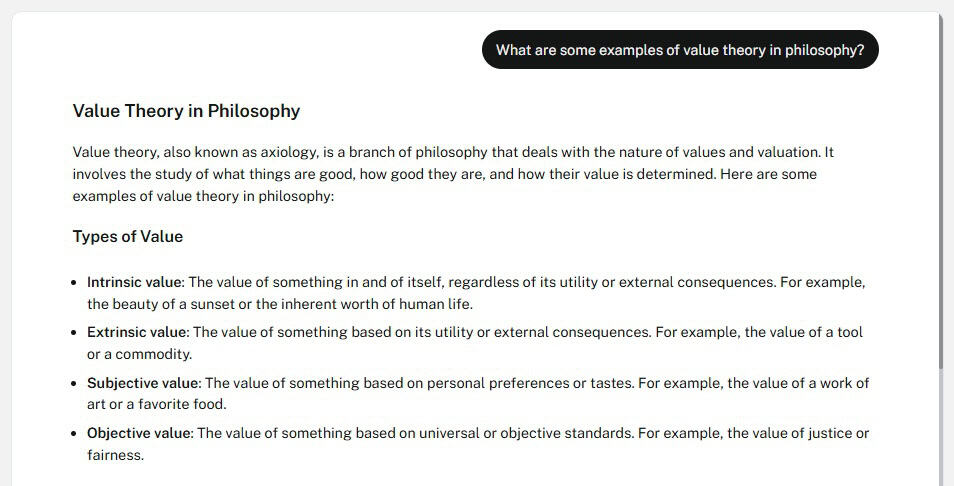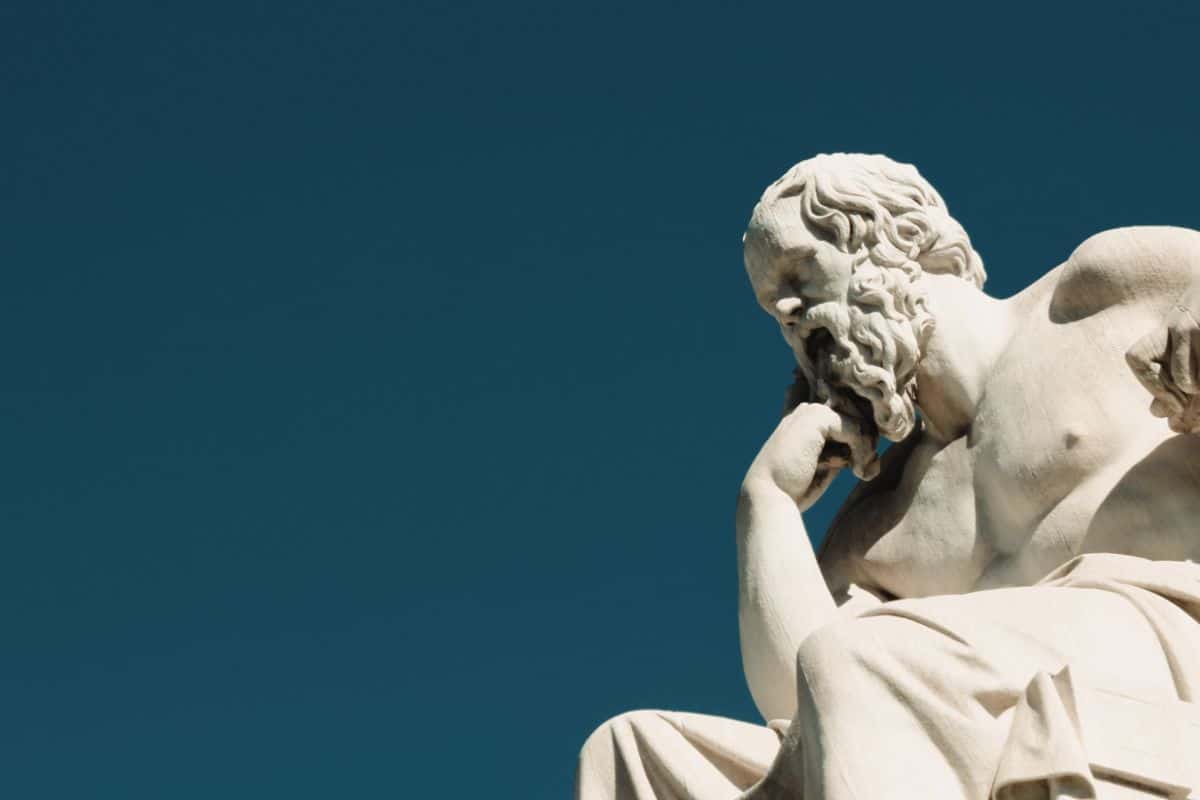What does it mean to live a good life? How do we know what’s real? And does anything even exist… like at all?
If these questions have ever crossed your mind, congratulations! You’ve engaged in philosophical thinking, just like the great minds that have shaped human thought for thousands of years (looking at you, Plato and Socrates).
But what does philosophy really mean? And why does it even matter?
In this beginner’s guide, we’re breaking down the true definition of philosophy; exploring its origins, main branches, and relevance for modern life.
TL: DR – Philosophy aims to make sense of the human experience, helping us better understand our reality and make good decisions for ourselves and society.
Key Takeaways
- Philosophy means “love of wisdom” and explores life’s biggest questions.
- The six main branches cover reality, knowledge, ethics, logic, art, and politics.
- Ancient Greek, Eastern, and modern thinkers shaped philosophy’s evolution.
- Philosophy sharpens critical thinking, reasoning, and decision-making skills.
- It bridges abstract ideas with practical issues in science, politics, and ethics.
- Philosophy matters today by guiding truth-seeking and meaningful living.
What Is Philosophy?

Philosophy is best defined as:
- The systematic study of fundamental questions about life and
- The pursuit of wisdom
This typically involves themes surrounding existence, knowledge, values, moral concepts, reason, and human nature.
Yes, it’s a bit abstract.


Never Worry About AI Detecting Your Texts Again. Undetectable AI Can Help You:
- Make your AI assisted writing appear human-like.
- Bypass all major AI detection tools with just one click.
- Use AI safely and confidently in school and work.
But the general principles of philosophy do overlap with more practical fields, such as natural and social sciences, religion, politics, and ethics.
Here’s how:
- Science may try to figure out how the universe began, but philosophy asks: Why is there something rather than nothing?
- Politics may track voting trends, but philosophy asks: What makes a government just?
- Medical research can discover potential treatments, but philosophy asks: Who should get access to which treatments first?
So in a sense, philosophy is like a bridge between our collective abstract thoughts and the real-world problems we all face.
Core Philosophy Definition and Etymology (Greek roots: philo + sophia)
The definition of philosophy comes from two Greek words:
- Philo – which means “love”
- Sophia – which means “wisdom”
Put the two words together, and philosophy literally means “love of wisdom”.
The Main Branches of Philosophy

Philosophy is often divided up into six core branches, with each branch addressing a different dimension of human knowledge and values.
Branch #1: Metaphysics (reality and existence)
Metaphysics is all about asking: What is real?
For example, this specific branch of philosophy digs into philosophical questions like:
- What is time?
- Do we really have free will, or is it an illusion?
- What does it even mean for something to “exist”
So if you’ve ever started thinking about the universe at 2 a.m. and wondered if life is just one big simulation, then you’ve dipped your toes in metaphysics.
Branch #2: Epistemology (knowledge and truth)
Epistemology is all about knowledge, truth, and belief, seeking to understand: how do we know what we know?
For example, this branch of philosophy might address the following questions:
- Can human beings ever achieve certainty?
- Can we trust our senses?
- What counts as knowledge vs opinion?
Basically, how do you know (or not know) whether this is all a dream?
Branch #3: Ethics (morality and values)
Ethics (sometimes called moral philosophy) is probably the most practical branch of philosophy, because it deals directly with how people live and act.
For example, ethics helps us answer questions like:
- What makes something good vs bad?
- What’s the difference between right and wrong?
- Should morality be absolute with fixed rules, or should it be relative and dependent on context?
This is the branch that shapes a lot of debates, like whether governments should prioritize individual freedoms over public safety, or if businesses should balance profits with social responsibility.
Branch #4: Logic (reasoning and argument)
Logic is like a toolkit or framework for philosophy itself. It establishes the rules of reasoning, allowing us to build valid arguments, spot contradictions, and avoid falling for flawed arguments.
Some examples of logical reasoning include:
- Deductive reasoning: A famous example of this is, “If all humans are mortal and Socrates is human, then Socrates must be mortal.”
- Inductive reasoning: For example, we can assume that if the sun has risen every day in recorded history, then it will probably rise again tomorrow.
- Avoiding fallacies: A common logical fallacy is when an argument attacks a person’s character, instead of addressing their actual point.
Logic to philosophy is a lot like grammar is to writing.
If your reasoning and arguments don’t follow the rules, then your conclusions can’t be taken seriously.
Branch #5: Aesthetics (beauty and art)
This is the more fun and creative side of philosophy. Aesthetics explores questions like:
- What makes something beautiful?
- What makes art valuable?
- Is natural beauty considered art?
So if you’ve ever admired an old building or stopped to take a picture of a sunset, you’ve already engaged with the philosophical notion of aesthetics.
Branch #6: Political Philosophy (justice, rights, society)
Political philosophy addresses themes surrounding how societies and governments should be structured, asking questions like:
- What makes a society fair?
- Do people have natural rights?
- Do people have a moral obligation to obey the law?
- What does it mean to make a moral decision?
This is where philosophy can get a bit heated, fueling political revolutions and endless arguments around the dinner table.
Pro Tip for Students: If you have to write a paper on the branches of philosophy, use our AI Chatbot and AI Question Solver during the brainstorming phase.
For example, we asked AI Chatbot to give us some examples of value theory in philosophy.

The Chatbot then gave us some inspiration for the different values-based philosophical theories, which would be helpful for creating an outline and getting something on the page.
From there, you can take the raw examples and run with them, using the assigned readings and your own experiences to shape your ideas and arguments.

You can also upload the question or prompt from your assignment directly into AI Question Solver, and you’ll receive a comprehensive response on how to approach and answer the question.
You can also use our our Undetectable AI’s AI Checker to verify whether educational definitions or explanations were AI-generated.
It helps ensure that your study materials, essays, and reference notes are original, accurate, and genuinely human-written.
Historical Development of Philosophy
Humans have been engaging in philosophical thinking since the very first person looked up at the sky and thought, Why am I here?
But as a more formal discipline, here’s how the study of philosophy has evolved over the years:
- 5th-4th century BCE: This is where it all kicked off, with ancient Greek philosophers like Socrates, Plato, and Aristotle setting the foundation for Western philosophy, asking the fundamental questions about ethics, knowledge, and politics.
- 1500 BCE-500 CE: Meanwhile, ancient Eastern philosophy emerged in places like India, China, and Japan, which explored themes like harmony, balance, meditation, and the human condition.
- 5th-15th Century: Fast forward to the Middle Ages, where the study of philosophy overlapped with world religions, primarily focusing on moral principles, religious language, and the existence of God.
- 17th-19th Century: Then came the Enlightenment and the nineteenth century, which brought a new emphasis on science, reason, and political philosophy.
- 19th Century-Now: Today, philosophy is everywhere, intersecting with modern science, social sciences, technology, and applied fields like environmental ethics, medical research, and business ethics.
Even though the way humans have thought about philosophy has changed, the core goal has stayed the same: to seek truth, to question assumptions, and to explore what it means to live a meaningful life.
Common Misconceptions About Philosophy
People often hear the word “philosophy” and immediately think it’s…
- Too abstract
- Not relevant to the real world
- Just about arguing (without actually finding answers)
But these assumptions miss the point. The truth is that philosophy is…
- Practical: It improves critical thinking and logical reasoning skills, helping you make better decisions.
- Broad: It overlaps and enhances so many other disciplines, like natural sciences, social sciences, religion, and cultural studies.
- Foundational: Many modern fields (like political theory, psychology, applied ethics, and even computer science) would not be here today without philosophy.
Sure, studying academic philosophy at school can feel like a lot of words and confusing definitions.
But once you strip away the jargon and learn how to really use your brain to think, you’ll start to notice the value of philosophical thinking in so many different aspects of your life.
Test your writing through our AI Detector and Humanizer in the widget below!
Frequently Asked Questions About Philosophy
What is a philosophy definition in simple terms?
A simple definition of philosophy is: the study of life’s biggest questions surrounding existence, knowledge, and morals.
What is philosophical inquiry?
Philosophical inquiry is a form of critical inquiry, and it’s the practice of asking deep, critical questions about the fundamental aspects of life and human existence.
What is the definition of control in philosophy?
In philosophy, the concept of “control” is a person’s ability to direct their own actions and decisions. Typically, this topic is explored in debates surrounding free will and moral responsibility.
Is philosophy only about Western thought?
Not at all. Eastern and African philosophy also explores human existence, values, and wisdom from their own cultural and historical perspectives.
Final Thoughts on Philosophy
Scientific knowledge gives us facts about the world. But philosophy helps us think about:
- What do these facts mean?
- Why do they matter?
- What should we do about it?
The goal of philosophy isn’t necessarily to have all the right answers to these questions.
Instead, it’s more about learning how to ask the right questions so we can learn more about the world around us and refine the way we live.
With Undetectable AI’s AI Chatbot and AI Question Solver, you can explore complex questions with deeper insights and clearer answers.
Try Undetectable AI today and expand the way you think, write, and create.
